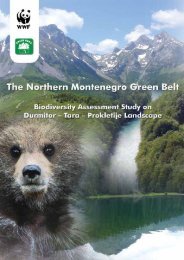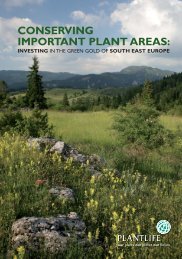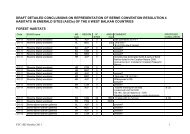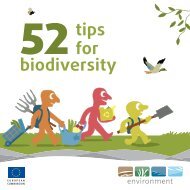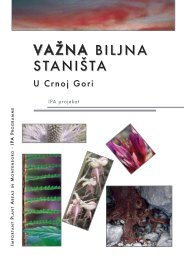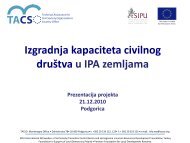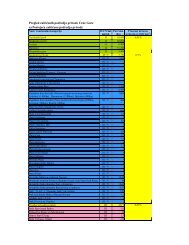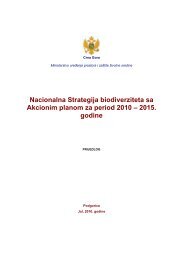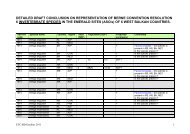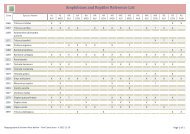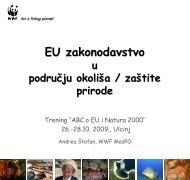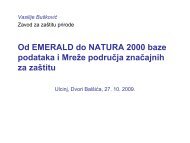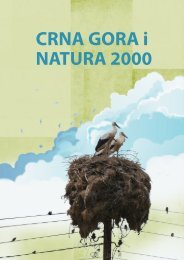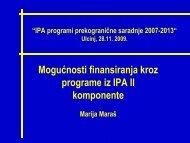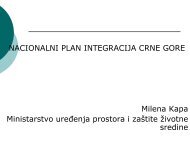prezentacije sa treninga
prezentacije sa treninga
prezentacije sa treninga
You also want an ePaper? Increase the reach of your titles
YUMPU automatically turns print PDFs into web optimized ePapers that Google loves.
Kampanja u borbi protiv<br />
klimatskih promjena<br />
Iskustva NVO Green Home<br />
Nata<strong>sa</strong> Kovacevic<br />
NGO Green Home, December 2010.
Earth Hour –<br />
Sat za nasu planetu<br />
Globalna kampanja u borbi protiv klimatskih promjena<br />
prvi put organizovana 2007. u Sidneju (Australija) <strong>sa</strong> ucescem preko 2<br />
miliona ljudi<br />
znacajna nacionalna obiljezja zemalja (most Golden Gate u San<br />
Francisku, Kalifornija, Koloseum u Rimu, Italija, Opera kuca u Sidneju<br />
Australija…)<br />
2009 – 100 M ucesnika, 1.7. M podrzavaoca, 4088 gradova, 88 zemalja<br />
Cilj akcije podrska planeti u susret Samitu UN u Kopenhagenu u<br />
decembru 2009.<br />
NGO Green Home, September 2009.
Ciljna grupa:<br />
• Opstine (donosioci odluka)<br />
• Ministarstva<br />
• Gradjani<br />
• Privatne kompanije<br />
Aktivnosti/vremenski rokovi:<br />
• Januar:<br />
•<br />
Organizovanje<br />
kampanje 2009<br />
Postavljanje website informacija (Green Home <strong>sa</strong>jt i Earth Hour<br />
Facebook)<br />
Sastanci i dogovor <strong>sa</strong> Ministarstvima i institucijama<br />
Komunikacija i dogovor <strong>sa</strong> privatnim kompanijama i drugim<br />
insitutcijama<br />
Februar:<br />
Raspodjela informacija prije dogadjaja<br />
Dogadjaj u noci 28 Marta 2009<br />
Izvjestaj<br />
NGO Green Home, December 2010
Organizovanje<br />
kampanje 2009<br />
Ocekivani rezultati:<br />
• Ucesce najmanje 10 privatnih kompanija<br />
• Ugasena svijetla na odabranim lokacijama<br />
• Ucesce preko 20 volontera<br />
• Ucesce oko 15 nevledinih organizacija<br />
• Preko 1 000 posjetioca <strong>sa</strong>jta (Earth Hour i Green Home)<br />
• Informi<strong>sa</strong>no oko 20 000 gradjana o dogadjaju<br />
Rizici:<br />
• Lokacija okupljanja moze biti promjenjena zavisno od<br />
dopusta Opsine Podgorica<br />
• Kompanije mogu odustati od dogovorenih aktivnosti<br />
• Vremenski uslovi mogu ugroziti aktivnosti napolju 28<br />
(crtanje zvijezda)<br />
• Nezainteresovanost gradjana za dogadjaj<br />
• Izbori 29 Marta!!!<br />
NGO Green Home, December 2010
Aktivnosti<br />
kampanje<br />
•<br />
•<br />
•<br />
Sastanci:<br />
Opstina Podgorica: osoba za kontakt i<br />
komunikaciju<br />
Slavne licnosti (glumci, pjevaci, voditelji)<br />
Privatne kompanije – ProMonte<br />
Opstina Niksic: sopstveni Facebook i<br />
ucesce<br />
TV kuce: besplatno objavljivanje spotova<br />
Stampanje promomaterijala<br />
posteri<br />
Lifleti<br />
Majice<br />
solarne lampe<br />
Sirenje informacija<br />
Redovno azuriranje Facebook i GH site,<br />
uvezivanje <strong>sa</strong> globalnim dogadjajima<br />
Mail liste, bilten (mediji i NVO)<br />
Press konferencija<br />
Promocija u skolama:<br />
2 skole<br />
Predstavljanje EH<br />
Konkurs za literalni rad EH
Aktivnosti kampanje<br />
2009<br />
Prvi put organizovan u Crnoj Gori<br />
otežani uslovi: izbori, promjena lokacije, utakmica CG<br />
–IT<br />
Dogadjaju prisustvovalo 20 volontera i blizu 100<br />
građana.<br />
Grupa Krug dala podršku kampanji<br />
OŠ „Pavle Rovinski“:<br />
• Recitacija Sat za planetu zemlju posvećena Earth<br />
Hour.<br />
• ritmicki nastup učenica<br />
Predsjednik skupštine Glavnog grada dr. Đorđe<br />
Suhih<br />
Odbrojavanje do gasenja svjetala i performans EH <strong>sa</strong><br />
solarnim lampama<br />
knjiga poruka, promotivni materijal EH (majice,<br />
lifleti, solarne lampe) i <strong>sa</strong>vjeti za uštedu energije.<br />
muzika DJ Chevallije
troskovi:<br />
Utroseno vrijeme – 20<br />
radnih dana, ukljucujuci<br />
dosta komunikacije<br />
(telefonski pozivi,<br />
<strong>sa</strong>stanci,mediski nastupi,<br />
ukljucena 3-4 covjeka iz<br />
GH tima i jedan iz<br />
Opstine Podgorica).<br />
Doprinos Green Home,<br />
pokrivanjem<br />
kancelariskih troskova<br />
Materijall – EH posteri,<br />
lifleti, majice, GH brosure<br />
o ustedi energije i<br />
klimatskim promjenama<br />
EH knjiga poruka <strong>sa</strong><br />
potpisima gradjana<br />
1066 eura!<br />
Troskovi i doprinosi<br />
Doprinos stakeholders:<br />
Opstina: osoba za snimanje, proslijedjivanje materijala Tv<br />
stanicama (TV MBC, RTVCG1, RTVCG2, Montena TV)<br />
Lokalna osoba zaduzena za rad <strong>sa</strong> GH (Danilo Kalezic, PR<br />
manager of Podgorica Municipality).<br />
Prisustvo predsjednika skupstine glavnog grada na dogadjaju,<br />
pozdravna rijec, simbolicno gase svjetala i odbrojavanje.<br />
KIC BUdo Tomovic, bina i ozvucenje, postavljenje<br />
Rok bend “Krug” i DJ Chevallie, muzicki nastup<br />
Recitacija posvecena EH i ritmiski nastup 6 ucenica OS “Pavle<br />
Rovinski”,<br />
JP Komunalno, kran za snimanje gasenja svijetala iz vazduha<br />
GH volonteri prisustvo na dogadjaju, dijeljenje materijala, lampi,<br />
majica, izvodjenje performan<strong>sa</strong><br />
Nas EH FB grupa 235 clanova, 7 zahtjeva za volonterizmom
Defin<strong>sa</strong>nje akcionog plana za<br />
dogadjaj u Podgorici i Niksicu<br />
Defini<strong>sa</strong>nje partnera i<br />
zainteresovanih strana(osnovne<br />
skole, NVO, Glavnim grad, Trzni<br />
centar Delta Siti)<br />
Uspostavljanje partnerstva <strong>sa</strong><br />
lokalnim NVO i zainteresovanim<br />
stranama<br />
Izrada promo materijala (Majice,<br />
reklame u novinama, solarne<br />
lampe)<br />
Podjela informacija (website,<br />
facebook, e-lists)<br />
Organizovanje prezentacija u<br />
skolama o energetskoj efikasnosti u<br />
Niksicu (NVO Ozon)<br />
Raspodjela promotivnog materijala<br />
Aktivnosti 2010
Aktivnosti 2010<br />
Earth Hour dogadjaj<br />
27.marta<br />
Trzni centar Delta siti<br />
100 ucesnika (NVO, javne<br />
institucije, gradjani,<br />
privatna udruzenja,<br />
volonteri GH)<br />
Ucenici osnovnih skola <strong>sa</strong><br />
ucescem u zabavnom dijelu<br />
programa<br />
Performans <strong>sa</strong> solarnim<br />
lampama
Dogadjaj podrzan od<br />
strane velikih<br />
kompanija (T-Mobile<br />
i Telenor) –<br />
ugasena<br />
svjetla 60 minuta u<br />
centralnim zgradama<br />
Visoka medijska<br />
zastupljenost (5<br />
najava dogadjaja i<br />
razgovora o temi i<br />
prisustvo 6 medija na<br />
<strong>sa</strong>mom dogadjaju)
Naucene lekcije<br />
Sa malim sredstvima je moguce<br />
postici velike rezultate<br />
Rezultate kampanje je moguce<br />
koristiti i nakon njenog zavrsetka<br />
Mediji su zainteresovani za<br />
dogadjaje <strong>sa</strong> performansima (npr.<br />
Solarne lampe)<br />
Postize se bolja <strong>sa</strong>radnja <strong>sa</strong><br />
privatnim sektorom, u velikom<br />
broju slucajeva po prvi put<br />
Najzahvalniji je rad s djecom<br />
Treba razmisljati o jasnim<br />
porukama koje zelimo uputiti i<br />
efektima koje zelimo postici<br />
(dugorocno i kratkorocno)
Thanks for<br />
attention!
N2000 & BIODIVERSITY PROTECTION –<br />
COMMUNICATING WITH DIFFERENT<br />
STAKEHOLDERS<br />
MONTENEGRO, 01-03 December 2010<br />
With the support of:
Training Agenda<br />
01.12 02.12 03.12h 9.00h ‐ Opening and introduction<br />
‐ Introduction<br />
‐ Introduction<br />
Facilitation: Project team<br />
Session 4: Biodiversity protection and N2000 ‐ Session 8: Group/individual work‐ preparation of local<br />
how to talk to different stakeholders<br />
action project outline<br />
Lecture: Petra Boic Petrac, WWF<br />
MedPO,Communications Officer<br />
Facilitation: Project team<br />
10.30h Break Break Break<br />
11.00h Session 1: Developing and delivering policy<br />
mes<strong>sa</strong>ges<br />
Lecture: Christoph Stein; WWF MedPO<br />
Session 5:Practical session with local journalists<br />
and/or other media<br />
Facilitation : Petra Boic Petrac, WWF<br />
MedPO,Communications Officer<br />
12.45h Lunch Lunch Lunch<br />
14.00h Session 2: Earth Hour<br />
Lecture: Petra Boic Petrac, WWF<br />
MedPO,Communications Officer<br />
Session 6: Advocacy strategy and communication<br />
Lecture: Christoph Stein; WWF MedPO<br />
15.30h Break Break Break<br />
16.00h<br />
to<br />
17.00h<br />
Session 3: Building coalitions<br />
Lecture: Christoph Stein; WWF MedPO<br />
Session 7: Local actions on the ground –<br />
introduction to small grants<br />
Lecture: Project team<br />
Session 9:Presentation of action outline and peers<br />
review<br />
Facilitation: Christoph Stein; WWF MedPO<br />
Session 10: Evaluation & planning of next steps<br />
Facilitation: Project team<br />
Departure
LEARNING OBJECTIVES<br />
1. Learn about key aspects of successful communicating with<br />
diverse stakeholder groups about N 2000 and biodiversity<br />
protection<br />
2. Define and work out a first outline of a successful<br />
communication action in your community<br />
3. Meet representatives of local media to understand their<br />
expectations and way of working
Opening and Introduction<br />
1. Presentation of participants: Why are you here? What do<br />
you expect from the training for you and for your<br />
organi<strong>sa</strong>tion?<br />
2. Discussion of programme and way of working together
Introduction: What is advocacy?<br />
Working group exercise 1: constructing a definition of<br />
advocacy
Introduction: What is advocacy?<br />
Advocacy refers to organized efforts by citizens to<br />
influence the formulation and implementation of public<br />
policies and programs by persuading and pressuring state<br />
authorities, international financial institutions, and other<br />
powerful actors. (cedpa)<br />
Advocacy is an action directed at changing the policies,<br />
positions or programs of any type of institutions. (Ritu R.<br />
Sharma)
Introduction: What is advocacy?<br />
Advocacy is a tool for citizen participation<br />
It is one of the ways—together with elections, open forums,<br />
special commissions, and so on—that different sectors of<br />
civil society can put forward their agendas and have an<br />
impact on public policies.
Introduction: What is advocacy?<br />
Citizen participation requires:<br />
• Internal democracy<br />
• Human and economic resources<br />
• Consciousness<br />
• Willingness to struggle<br />
• Credibility<br />
• Ability to mobilize people<br />
• Good leaders<br />
• Alliances
Introduction: What is advocacy?<br />
Advocacy as the exercise of power<br />
• To the extent that the citizenry is able to influence<br />
decisions made by entities of the state, it is exercising its<br />
own power as civil society. Advocacy can be seen as the<br />
exercise of power by the citizenry in the face of the<br />
government’s power.
Introduction: What is advocacy?<br />
Why Engage in Advocacy?<br />
There are many reasons to engage in advocacy. The most<br />
important from a civil society perspective are:<br />
(a) to solve specific problems through concrete changes in<br />
public policies and programs;<br />
(b) to strengthen and empower civil society;<br />
(c) to promote and consolidate democracy.
Introduction: What is Advocacy?<br />
Conceptual framework for Advocacy:<br />
It is a dynamic process involving a changing set of actors,<br />
ideas, agendas and politics
Dimensions of Change in Advocacy<br />
STRUCTURAL<br />
CHANGES<br />
• Democratization of<br />
decision-making spaces<br />
• Ways of governing<br />
• Capacity for execution<br />
CULTURAL<br />
CHANGES<br />
• Values<br />
• Behaviors<br />
• Customs<br />
• Empowerment processes<br />
POLITICAL<br />
CHANGES<br />
• Public policies<br />
• Creation and reform of<br />
laws<br />
• Budgets<br />
• Programs
Introduction: What is Advocacy?<br />
Factors within NGOs that increase capacity to do advocacy:<br />
• Internal democracy<br />
• Willingness to interact with the government<br />
• Willingness to build and consolidate alliances<br />
• Long term vision for societal transformation<br />
• A clear mission statement.
Introduction: What is Advocacy?<br />
Advocacy step by step:<br />
1.Identify and analyse the problem<br />
2.Formulate the propo<strong>sa</strong>l: What do we want to achieve?<br />
3.Analyze the decision-making space: how and when, by whom a<br />
decision will be taken in response to our request?<br />
4.Analyze channels of influence: Who are the actors that can influence<br />
the decision-making process?<br />
5.Analyse the strength + weakness of your advocacy team/group: what<br />
are opportunities /threats to the initiative?<br />
6.Design advocacy strategy<br />
7.Develop activity plan:what must be done to carry out the chosen<br />
strategy<br />
8.Carry out continues evaluation: what has been done?
Policy Issue:<br />
Introduction- Identifying Policy Issues<br />
A problem or situation which an institution or organization<br />
could take action to solve
Introduction: Identifying Policy Issues<br />
The policy process is about selecting one policy option from<br />
among several choices, is essentially a negotiation among<br />
various actors.<br />
In order to be included in the negotiation process, data and<br />
research must be translated into information and presented<br />
in formats that policy makers can understand and use.
Introduction: Identifying Policy Issues<br />
The advocacy team has to decide what problem it wishes to<br />
solve. The policy issue should:<br />
1.Relate to the mission of the group<br />
2.Be solvable through changes in public policy<br />
3.Deeply felt by a significant section of the<br />
community/society<br />
4.Motivating for the team/group
Introduction: Identifying Policy Issues<br />
Once the problem to be solved has been identified starts a<br />
deeper analysis of causes and consequences:<br />
1.Why did the problem arise? What are the main causes?<br />
What are its consequences?<br />
2.Prioritization of the causes: which of the causes should be<br />
addressed first? Is there a cause blocking the resolution of<br />
the others?<br />
3.Detailed examination of the prioritized cause: seperating<br />
in different contributing factors
Criteria for<br />
prioritization of a<br />
problem<br />
Deeply felt by a<br />
significant<br />
section of<br />
society<br />
Politically and<br />
technically<br />
feasible to<br />
solve<br />
Motivating for<br />
the group
Introduction: Identifying Policy Issues<br />
Lessons learned from advocacy experiences:<br />
1.Inadequate information is a common obstacle that impedes the analysis<br />
of problems.<br />
2. Confusion between causes and consequences is a constant danger<br />
3. Incomplete examination of a problem can lead a group to concentrate<br />
its efforts on resolving less-important issues<br />
4.In practice, many groups prioritize problems that are of little importance<br />
to the general population. This limits the possibility for mobilizing other<br />
groups in society to act and make it difficult to maintain momentum<br />
5. Another frequent mistake is to analyze a problem without consulting<br />
those groups in society that are most affected by it.
Step 1 –Resource 7<br />
Do not confuse<br />
causes and<br />
consequences<br />
Problems that are<br />
deeply felt tend to<br />
generate special power<br />
Obtain the information<br />
needed to formulate<br />
strategies<br />
LESSONS<br />
LEARNED<br />
Move beyond<br />
generalities<br />
Analyze specific<br />
aspects of the<br />
problem<br />
Get advices from<br />
others to pinpoint<br />
the problem<br />
Involve those who<br />
are affected by the<br />
problem
Training Agenda<br />
01.12 02.12 03.12h 9.00h ‐ Opening and introduction<br />
‐ Introduction<br />
‐ Introduction<br />
Facilitation: Project team<br />
Session 4: Biodiversity protection and N2000 ‐ Session 8: Group/individual work‐ preparation of local<br />
how to talk to different stakeholders<br />
action project outline<br />
Lecture: Petra Boic Petrac, WWF<br />
MedPO,Communications Officer<br />
Facilitation: Project team<br />
10.30h Break Break Break<br />
11.00h Session 1: Developing and delivering policy<br />
mes<strong>sa</strong>ges<br />
Lecture: Christoph Stein; WWF MedPO<br />
Session 5:Practical session with local journalists<br />
and/or other media<br />
Facilitation : Petra Boic Petrac, WWF<br />
MedPO,Communications Officer<br />
12.45h Lunch Lunch Lunch<br />
14.00h Session 2: Earth Hour<br />
Lecture: Petra Boic Petrac, WWF<br />
MedPO,Communications Officer<br />
Session 6: Advocacy strategy and communication<br />
Lecture: Christoph Stein; WWF MedPO<br />
15.30h Break Break Break<br />
16.00h<br />
to<br />
17.00h<br />
Session 3: Building coalitions<br />
Lecture: Christoph Stein; WWF MedPO<br />
Session 7: Local actions on the ground –<br />
introduction to small grants<br />
Lecture: Project team<br />
Session 9:Presentation of action outline and peers<br />
review<br />
Facilitation: Christoph Stein; WWF MedPO<br />
Session 10: Evaluation & planning of next steps<br />
Facilitation: Project team<br />
Departure
Earth Hour<br />
NATURA 2000 & BIODIVERSITY PROTECTION –<br />
Global public campaigning<br />
With support of:<br />
COMMUNICATING WITH DIFFERENT<br />
STAKEHOLDERS<br />
Montenegro, 01-03 December 2010
On the last Saturday of<br />
March annually,<br />
households and<br />
businesses should turn<br />
off all<br />
What is Earth Hour<br />
lights for one hour<br />
to raise awareness<br />
towards the need to take<br />
action on climate<br />
change<br />
•1 person/ whole<br />
•Celebrations<br />
on the<br />
family/ business<br />
sector<br />
streets/ concerts<br />
•Debates on TV/ radio/ print/ web on<br />
climate change<br />
•Special<br />
way<br />
of advertising<br />
•Earth Hour symbolizes what we can do<br />
when the world acts together
Background on Earth Hour<br />
- Earth Hour began in one city, in Australia in 2007. More<br />
than 2.2 million households and businesses in Sydney<br />
- One year later, Earth Hour reached 370 cities and towns<br />
in more than 35 countries across 18 time zones - an<br />
estimated 50 to 100 million people around the world<br />
switched off their lights for Earth Hour in 2008<br />
-In its third year Earth Hour 2009 created history as the<br />
greatest voluntary action ever witnessed - 88 countries,<br />
4159 cities, more than 80 million people<br />
- In 2010 more than half billion people in more than 4500<br />
cities and towns in 128 countries turned off their lights for<br />
Earth Hour.
What you get from Earth Hour<br />
<br />
<br />
Visibility<br />
New contacts<br />
in public<br />
and business<br />
sector<br />
Your campaign - Earth Hour is the platform to push local<br />
mes<strong>sa</strong>ges for environmental communications<br />
Opportunity<br />
to be<br />
part of global movement
Issues to be communicated<br />
The biggest threat to life on earth is climate change<br />
A way in which global warming can be slowed down is if<br />
individuals make small changes to the way they live<br />
To make a change we have to show how easy it can be<br />
for individuals
Detailed<br />
Best ways to communicate EH:<br />
communications<br />
Define target groups<br />
Objectives<br />
Think of activities<br />
Available funds<br />
Expected results<br />
Define possible risks<br />
strategy:<br />
You get campaign ready to use –<br />
it depends on you how<br />
it will look like
In 2008 the<br />
Success story - Portugal<br />
Portuguese<br />
were<br />
unaware<br />
of Earth<br />
Hour<br />
In 2009 first Earth Hour – 5 months of preparations; more<br />
than 500,000 persons switched off lights in their houses; 11<br />
cities involved leaded by Lisbon; 20 companies committed<br />
with EH mes<strong>sa</strong>ge; The social networks were a good means<br />
of spreading the EH mes<strong>sa</strong>ge; 4 media partners<br />
In 2010 second Earth Hour – 3 months of preparations;<br />
more than 1,000.000 people involved; 27 cities involved<br />
with the help of ANMP (biggest success in Porto – 54<br />
monuments were in dark); 2 major sponsors (IKEA, Coca-<br />
Cola) and many partners and supports; VIPs
Based on the 1st results of 2009 when the event was organized for<br />
the 1st time:<br />
-<br />
Overall objectives for EH 2010 in Western<br />
Balkans<br />
Increase number of participating cities<br />
- Increase public participation<br />
- Increase media presence<br />
- Get between 3 and 5 private companies on board<br />
- Organize an action that will last for the whole year, to give<br />
continuity and enable to maintain and develop our profile.<br />
- Get at least 2 celebrities supporting our actions.
Overall results in 2010 in the Western Balkans<br />
• Over 60 cities and towns participating (more than doubled from 2009)<br />
• Private companies, local NGOs involved<br />
• Over 300 media outputs<br />
• Huge visibility thanks to social media and web<br />
• Around 30 actions in the 4 countries on March 27, including open air<br />
concerts (Banjaluka, Sarajevo), competition in schools with traditional<br />
games to show how playing can be fun without playstation/electricity,<br />
children exhibitions, sending children’s mes<strong>sa</strong>ges to the government,<br />
gatherings with candles in front of emblematic monuments, poetry<br />
evenings, "bookcafés" and public debates, inauguration of the first solar<br />
kinder garden in Montenegro, etc. 30 000 leaflets were distributed in<br />
Croatia through local NGOs.<br />
Two objectives were not reached (actions running all year long and<br />
celebrities’ involvement)
Results per country<br />
Bosnia & Herzegovina
Strong media presence was established thanks to adapted advertising<br />
contents (TV spots, Print ads, Internet banners...).<br />
In addition free media space was obtained in all top media and on the<br />
main billboards in each participating city.<br />
Constant communication was maintained with relevant media, including<br />
interviews, guest appearances and feature stories,<br />
press releases, etc.
A special website was created<br />
in local language, giving in<br />
particular some tips on how to<br />
<strong>sa</strong>ve energy tips.<br />
The Facebook profile for Earth hour<br />
in BiH had 4,894 followers daily<br />
during the campaign and<br />
discussions continue to this day.<br />
A twitter Earth hour profile was also<br />
developped which now has 257<br />
followers.
In kind support was obtained from Hypo Alpe-Adria-Bank,<br />
second largest banking corporation in the country.<br />
•<br />
•<br />
They placed EH 2010<br />
welcome screen ATM<br />
machines, effectively<br />
reaching thou<strong>sa</strong>nds of<br />
people every day.<br />
On March 27 they emailed<br />
a reminder to all clients.
In kind support was also obtained from Mercator supermarket in Banjaluka city<br />
•<br />
•<br />
Mercator<br />
supermarket chain<br />
supported the<br />
event with<br />
promotional<br />
banners<br />
Leaflets were also<br />
handed out to<br />
customers by<br />
promoters dressed<br />
in EH shirts
On the night: Sarajevo
On the night: Banjaluka
On the night: Livno
Results per country<br />
Croatia
Among the successful actions:<br />
- involvement of many local NGOs, covering the whole<br />
territory<br />
- media work<br />
- visits to schools<br />
- the best response was in towns Biograd and Makarska (which<br />
was joined by the neighbouring municipalities along the sea coast<br />
– all in all, more than 27,000 inhabitants), where the complete<br />
street lights were switched off.<br />
- the <strong>sa</strong>me happened in Višnjan (whose mayor, interested in<br />
<strong>sa</strong>vings on the power bill, asked why not extend the action for a<br />
whole night or more)
And more …<br />
- The city of Šibenik joined in spontaneously, by turning lights off at their famous<br />
cathedral of St. Jacob.<br />
- In Zagreb, the lights were switched off in the Tkalčićeva street, The Regent<br />
Esplanade hotel also turned off the lights on the outside of the building.<br />
- In some places the organi<strong>sa</strong>tions managed to have landmark buildings in the dark<br />
despite the non-cooperation of the city authorities (the Zadar bridge was dark from<br />
20:30 to 21:30).<br />
- In Osijek the city authorities agreed to turn off lights on the pedestrian bridge over<br />
the Drava river.<br />
- In Varaždin the lights went off on some of the main streets in the town.<br />
More than 12 cities participated
Media partners
On the night: Makarska
EARTH HOUR 2011<br />
video
EARTH HOUR 2011<br />
THE EARTH HOUR BRAND<br />
GROWS BEYOND THE<br />
HOUR TO<br />
EARTH HOUR +<br />
It’s not going to be only 1<br />
hour – let’s make it all year
EARTH HOUR 2011 – Global Key Mes<strong>sa</strong>ges<br />
1. Make an Earth Hour pledge for ongoing sustainable<br />
action<br />
2. Switch off your lights for one hour at 8.30pm,<br />
Saturday 26 March 2011<br />
3. Join the global pursuit for a better, healthier world<br />
4. Earth Hour symbolises the power of the individual,<br />
businesses and communities working together<br />
5. Everyone has responsibility, everyone has power,<br />
everyone can lead
EARTH HOUR 2011 - campaign<br />
print<br />
apps<br />
corporate<br />
tv
Thank you!<br />
Petra Boic<br />
Petrac<br />
WWF Mediterranean Programme
EARTH HOUR<br />
2010<br />
Serbia
2009 results in Serbia<br />
Local authorities in about 30 cities in Serbia has supported the<br />
action and switched off the lights<br />
4 national TV stations (B92, TV FOX, RTS, Studio B) and many<br />
local ones has invited people to participate<br />
Group on Facebook has reached 22 000 members
USP<br />
SER: Budite deo sveta u borbi protiv globalnog<br />
zagrevanja, iskljucite svetla na <strong>sa</strong>t vremena<br />
ENG: Be a part of the world battle against global<br />
warming, turning of the lights for one hour
Target Audience<br />
<br />
<br />
<br />
Individuals and households: Our aim is to reach over 1<br />
million people in Serbia. Most broadly the general public<br />
especially in Belgrade and Novi Sad<br />
National and local governments: official support and if<br />
possible active involvement of government offices (e.g.<br />
Ministry of Environment) as well as city governments,<br />
particularly those of Belgrade and possibly Novi Sad – lights<br />
off on prominent historical landmarks like the Belgrade castle<br />
(addressed through direct contacts);<br />
Private companies and other organi<strong>sa</strong>tions: at least 50<br />
companies officially signed up to actively support and promote<br />
Earth Hour (addressed through direct contacts, via chambers<br />
of commerce and other trade associations as well as through<br />
targeted media work);
Communication goals<br />
<br />
<br />
To promote public awareness of climate change and<br />
opportunities for reducing greenhouse gas emissions<br />
Increased awareness of the need for individuals to reduce CO2<br />
emissions<br />
Short term<br />
To engage as much people as possible to switch of the power for<br />
an hour during the defined period<br />
Long term<br />
To engage people to reduce power u<strong>sa</strong>ge in everyday life in order<br />
to <strong>sa</strong>ve the planet
IDEA<br />
2010 BRAND AMBASSADOR<br />
NIKOLA TESLA<br />
(10 July 1856 – 7 January 1943) was an Serbian inventor and a mechanical<br />
and electrical engineer. He was one of the most important contributors to the<br />
birth of commercial electricity, and is best known for his many revolutionary<br />
developments in the field of electromagnetism in the late 19th and early 20th<br />
centuries. Tesla's patents and theoretical work formed the basis of modern<br />
alternating current (AC) electric power systems, including the polyphase<br />
system of electrical distribution and the AC motor, with which he helped usher<br />
in the Second Industrial Revolution.
Support<br />
We provided official support from:<br />
Ministry of Environmental and spatial planning, Republic of Serbia<br />
Secretariat for Environmental Protection , Belgrade<br />
Cabinet of the Deputy Prime Minister for European Integration<br />
Mayor of Novi Sad
The results<br />
<br />
<br />
<br />
<br />
<br />
Local authorities in over 40 cities & settlements in Serbia has<br />
supported the action and switched off the lights<br />
All national TV stations in Serbia and many local ones has invited<br />
people to participate<br />
Over 90 announcements in printed & online media<br />
Various local radio stations supported the project<br />
Active online activities (including Facebook group with over 20 000<br />
members with daily updates about the project)
PRINT ADS<br />
Magazines and daily<br />
newspapers that published print<br />
ad free of charge
•<br />
BILLBOARD<br />
Regular Billboard without lights on frequent location in town free of charge
NEWSLETTER
T-SHIRTS
•<br />
PRESS CONFERENCE<br />
Press Conference speakers<br />
Goran Trivan - City of Belgrade, Secretariat for Enviromental Protection<br />
Alek<strong>sa</strong>ndar Maruncic - Academician, a professor of Electrical Engineering in<br />
Belgrade. He studied the life and work of Nikola Tesla. He was the director of the<br />
Museum of Nikola Tesla from 1982. until 1996. year.<br />
Duska Dimovic – WWF DCP<br />
Milica Stefanovic – Communication Manager, Coca Cola, Serbia
•<br />
•<br />
•<br />
•<br />
•<br />
Folder<br />
CD in CD cover<br />
PRESS CONFERENCE PROMO<br />
MATERIAL<br />
Press Release on recycled paper<br />
Stickers<br />
Flayers
EARTH HOUR EVENT<br />
<br />
<br />
<br />
III PHASE -<br />
event<br />
Few hours before EH parade of<br />
“Eco musketeers", pupils from<br />
primary schools in Belgrade, and all<br />
supporters of Earth Hour gathered in<br />
front of big monument of Nikola<br />
Tesla .<br />
As a support to the project Nikola<br />
Tesla monument was dresses in<br />
oversized EH T-shirt<br />
That was starting point of our<br />
journey through the city.
III PHASE -<br />
EARTH HOUR EVENT<br />
<br />
<br />
<br />
<br />
<br />
event<br />
From the monument of Nikola Tesla parade headed to Nikola Tesla museum.<br />
They carried big EH box full of children's mes<strong>sa</strong>ges for better planet<br />
During the walk children distributed flayers and stickers to people on the streets.<br />
In museum we were welcomed by PR of museum who told a short story about<br />
Tesla, showed us a movies and Tesla’s experiments.<br />
As a evidence of choosing perfect brand ambas<strong>sa</strong>dor for this project Museum<br />
asked for Nikola Tesla cut out to stay in museum and become part of Tesla’s<br />
legacy.
EARTH HOUR EVENT<br />
<br />
After museum, parade headed in front of City Hall to witness the lights go off and to<br />
give away box with over 260 mes<strong>sa</strong>ges to government representative.
Mes<strong>sa</strong>ges for better planet
Lights were switched off<br />
BEOGRAD – zgrade republičkih organa<br />
Zgrada predsedništva, Andrićev venac broj 1<br />
Zgrada vlade, ul. Nemanjina broj 11<br />
Zgrada pravosudnih organa, Nemanjina broj 9<br />
Zgrada ministarstava, Nemanjina 22-26<br />
Zgrada Ministarstva finansija, ul. Kneza Miloša broj 20<br />
Zgrada Ministarstva ekonomije i regionalnog razvoja, Bulevar Kralja Alek<strong>sa</strong>ndra broj 15<br />
Zgrada Vrhovnog <strong>sa</strong>veta sudstva, Re<strong>sa</strong>vska broj 42<br />
Zgrada republičkih organa uprave, Trg, Nikole Pašića broj11<br />
Zgrada Ministarstva rudarstva i energetike, Kralja Milana 36<br />
Palata na Novom Beogradu, Bulevar Mihajla Pupina broj 2<br />
Zgrada republičkih organa uprave, Omladinskih brigada broj 1<br />
Zgrada republičkih organa uprave, Dečanska broj 8<br />
Kalemegdanska tvrđava (<strong>sa</strong> spomenikom Pobedniku i kulom Nebojša)<br />
Hram Svetog Save<br />
Crkva Svetog Marka<br />
Ruska crkva<br />
Muzej Nikole Tesle, ul. Krunska 51<br />
Etnografski muzej<br />
Brankov most<br />
Stari Savski most<br />
Novi Železnički most<br />
Delta City, Jurija Gagarina 16<br />
Gradska Opština Vračar, ul. Njegoševa 77<br />
Sportski centar „Vračar“, ul. Sjenička 1<br />
JP „Poslovni prostor Vračar“, ul. Njegoševa 77a<br />
Direkcija za gradsko građevinsko zemljište, ul. Njegoševa 84<br />
Narodni univerzitet „Božidar Adžija“, Ul. Radoslava Grujića 3<br />
Gradska opština Zvezdara ul. Bulevar kralja Alek<strong>sa</strong>ndra br.77,<br />
Ustanova kulture Vuk Karadžić ul.Bulevar kralja Alek<strong>sa</strong>ndra br.77a<br />
Sportski centar Olimp, ul. Vjekoslava Kovača br.11 bice (ugasiće se deo osvetljenja)<br />
Gradska opština Voždovac
Lights were switched off<br />
NOVI SAD<br />
Gradska kuća i sve zgrade na Trgu slobode<br />
Srpsko Narodno Pozorište i Pozorišni trg<br />
Pravoslavna Saborna crkva<br />
Rimokatolička crkva Imena Marijina<br />
Petrovaradinska tvrđava<br />
(NIŠ)<br />
Trg Kralja Milana<br />
Sinđelićev trg<br />
Zgrada Skupštine Grada Niša u ul. Nikole Pašića 24,<br />
Zgrada Predsedništva u ul 7. juli 2<br />
Zgrada Uprave za komunalne poslove, energetiku i<br />
<strong>sa</strong>obraćaj u ul. Generala Tranijea 11a,<br />
Zgrada Uprave za planiranje i izgradnju u ul. Generala<br />
Tranijea 10,<br />
Zgrada u ul. Vožda Karađorđa 16<br />
Zgrada Gradske Opštine Pantelej<br />
(ČAČAK)<br />
Svaka druga ulična sijalica.<br />
(KRAGUJEVAC)<br />
Pešačka zona od ulice 27. marta do Krsta<br />
(KRALJEVO)<br />
Centralni gradski trg<br />
Gradsko šetalište<br />
Kulturni centar Ribnica u Ribnici <strong>sa</strong> platoom<br />
(PRIJEPOLЈE)<br />
Valterova ulica i svi parkovi u gradu.<br />
(ZRENJANIN)<br />
Gradska upravea grada Zrenjanina,<br />
Gradska narodna biblioteka ''Žarko Zrenjanin'',<br />
Narodno pozorište ''Toša Jovanović''<br />
Narodni muzej<br />
(PANČEVO)<br />
Gradski stadion, ul. Miloša Trebinjca br. 3<br />
Zgrada Gradske uprave grada Pančeva<br />
Volijera u parku "Narodna bašta"<br />
Kulturni centar Pančeva<br />
JKP „Vodovod i kanalizacija“: Sektor Vodovodna mreža,<br />
Braće Jovanovića bb, FCS- Luka Dunav, FCS- Mi<strong>sa</strong>,<br />
Vojvođanska bb, Sektor Kanalizacija, Moše Pijade 72<br />
Upravna zgrade, Izvorište- Sibnica, Pančevački put bb.<br />
Zgrada Doma kulture “ 25. maj“, Dolovo<br />
Zgrada Doma kulture ,,3.oktobar", Banatsko Novo Selo<br />
(SOMBOR)<br />
Zgrada skupštine grada Sombora i plato<br />
Toranj gradske kuće<br />
Kronić palata - zgrada privrednog suda<br />
Dečije odeljenju gradske biblioteke "Karlo Bjelički"<br />
Hramu Svetog Georgija<br />
Javna rasveta dužinom cele glavne gradske ulice -<br />
pešačka zona u ulici "Kralja Petra prvog"<br />
(PIROT)<br />
Objekat Opštinske uprave Pirot<br />
Dom kulture<br />
Sportski centar<br />
Objekti PU Čika Jova Zmaj<br />
OŠ Dušan Radović<br />
OŠ Sveti Sava<br />
OŠ 8 septembar<br />
OŠ Vuk Karadžić<br />
ŠOSO Mladost<br />
Srednja stručna škola<br />
Tehnička škola<br />
Gimnazija<br />
Ekonomska škola<br />
Mlekarska škola "Dr Obren Pejić"<br />
Visoka škola strukovnih studija
Lights were switched off<br />
(LESKOVAC)<br />
Zgrada Skupštine grada<br />
Zgrada Gradske uprave<br />
Zgrada Kulturnog centra<br />
Zgrada Narodnog pozorišta<br />
(PARAĆIN)<br />
Rasveta na platou kod spomenika Branku Krsmanoviću<br />
(DIMITROVGRAD)<br />
Redukovana javna rasveta za 50% u glavnoj ulici<br />
(GORNJI MILANOVAC)<br />
Zgrada Opštine Gornji Milanovac, ulica Takovska broj 2<br />
Zgrada Opštinske uprave opštine Gornji Milanovac, ulica<br />
Tihomira Matijevića broj 4<br />
Zgrada Okružnog načelstva, Knez Mihailov trg broj 1<br />
(SREMSKI KARLOVCI)<br />
Magistrat<br />
Gimnazija<br />
Saborna crkva<br />
Patrijaršijski dvor<br />
Bogoslovija<br />
Katolička crkva<br />
(VRANJE)<br />
Narodni muzej<br />
Zgrada gradske uprave<br />
Sedište Pčinjskog upravnog okruga<br />
(VRNJAČKA BANJA)<br />
Javna rasveta na teritoriji opštine<br />
(RUMA)<br />
40 % javne rasvete u gradu<br />
(KULA)<br />
JP "Zavod za izgradnju" Kula<br />
Opštinska uprava Kula<br />
JKP "Radnik" Sivac<br />
JKP "Vodovod" Crvenka<br />
Donjogradska praoslavna crkva<br />
Gornjogradska pravoslavna crkva<br />
Kapela mira<br />
SRC „Dvorska bašta“<br />
(SMEDEREVSKA PALANKA)<br />
Javna rasveta na teritoriji opštine<br />
(KOVIN)<br />
Zgrada OU Kovin , deo ulicne rasvete u<br />
Kovinu i rasvete u naseljenim mestima<br />
(BAČ)<br />
Opština Bač – Trg dr. Zorana Đinđića br.2<br />
JP “Direkcija za izgradnju opštine Bač” iz<br />
Bapa ul. Bačka br.4<br />
Osnovna škola “Vuk Karadžič” – Školska br.1<br />
Sportska hala – Školska b.b.<br />
Predškolska ustanova ”Kolibri” – Školska br.3<br />
JKP ”Tvrđava” – Maršala Tita br.73<br />
Mesne zajednice po naseljenim mestima<br />
opštine Bač<br />
Kulturno propagandni centar Bač – Trg dr.<br />
Zorana Đinđića br.4<br />
(TRSTENIK)<br />
Zgrada Opstine,<br />
Crkva<br />
(PETROVAC NA MLAVI)<br />
Zgrada SO Petrovac na Mlavi (zaštićena kao<br />
spomenik kulture)<br />
Zgrada osnovne škole<br />
Zgrada srednje škole "Mladost"<br />
"Sunce", zabavni deo parka <strong>sa</strong> pozornicom i<br />
terenima za košarku
Lights were switched off<br />
(KRŠUMLIJA)<br />
Zgrada Opštine Kuršumlija<br />
Zgrada JPKD Toplica Kuršumlija<br />
Zgrada JP Direkcija za izgradnju opštine<br />
Kuršumlije<br />
Zgrada OŠ Drinka Pavlović<br />
Zgrada OŠ Miloje Zakić<br />
Zgrade Ekonomske škole i gimnazije<br />
Kuršumlija<br />
Gradski park<br />
Manastir Sv. Nikola<br />
Celokupna gradska rasveta, tj.ulično<br />
osvetljenje u Kuršumliji<br />
(SOKOBANJA)<br />
Centralni gradski park<br />
Parku na "Banjici"<br />
Osvetljenje na igralištu "Mini pič" na Banjici u<br />
opštini Sokobanja.<br />
(BAČKI PETROVAC)<br />
Evangelistička crkva u ulici Maršala Tita<br />
Katolička crkva u ulici XIV VUSB.<br />
U Magliću - Evangelistička crkva u ulici Ivo<br />
Lola Ribara.<br />
U Gložanu - Evangelistička crkva u ulici<br />
Maršala Tita.<br />
U Kupinu - Pravoslavna i evangelistička crkva<br />
u ulici Maršala Tita.<br />
(ALIBUNAR)<br />
Zgrada Opštine Alibunar u Alibunaru, Trg<br />
slobode 4,<br />
Mesne zajednice u svim naseljima,<br />
Biblioteke u Alibunaru, Banatskom Karlovcu i<br />
Vladimirovcu,<br />
Pošte u Alibunaru, Banatskom Karlovcu i<br />
Vladimirovcu.<br />
(BOLJEVAC)<br />
Park u centru grada i plato istred pošte.<br />
(SRBOBRAN)<br />
Iskljucivanje javne rasvete u delu oko "žutog<br />
bunara”<br />
(LJUBOVIJA)<br />
Gerijatrijski centar Ljubovija<br />
Stambena zgrada blok 106-b<br />
Duvanov zanatski centar<br />
Osnovna škola „Petar Vragolić“<br />
(RAČA)<br />
Zgrada skupštine opštine<br />
Gradska crkva "Svetog Petra i Pavla"<br />
Karađorđevom domu.<br />
(TOPOLA)<br />
Crkva Svetog Đorđa na Oplencu<br />
(BEOČIN)<br />
Zgrada SO Beočin<br />
Javna rasveta u većini ulica u MZ Beočin<br />
(KOVAČICA)<br />
Zgrada opštine SO Kovačica<br />
OŠ „Mlada Pokoljenja“<br />
Gimnazija „Mihajlo Pupin“<br />
Predškolska ustanova „Kolibri“<br />
Dom kulture<br />
Opštinska biblioteka<br />
JKP Elan<br />
MZ Kovačica<br />
(PADINA)<br />
OŠ „Maršal Tito“<br />
Dom kulture<br />
JKP Padina<br />
MZ Padina
(DEBELJAČA)<br />
OŠ „Moše Pijade“<br />
Dom kulture<br />
JKP 4.Oktobar<br />
MZ Debeljača<br />
(CREPAJA)<br />
OŠ Sava Žebeljan<br />
Dom kulture<br />
JKP Rad<br />
MZ Crepaja<br />
Lights were switched off<br />
(SAMOŠ)<br />
OŠ „Lukrecija Ankuc“<br />
Dom kulture<br />
MZ Samoš<br />
(BEČEJ)<br />
Centar Bečeja – javna rasveta<br />
(UZDIN)<br />
OŠ Sveti Georgije<br />
Dom kulture<br />
JKP Banat<br />
MZ Uzdin<br />
(IDVOR)<br />
OŠ „Mihajlo Pupin“<br />
Dom kulture<br />
MZ Idvor
•<br />
•<br />
IV phase<br />
Online contest for the best non professional photo with theme “Earth hour”<br />
Tickets for the museum of Nikola Tesla for the winners
Event photos
Thank you
NATURA 2000 & BIODIVERSITY PROTECTION –<br />
COMMUNICATING WITH DIFFERENT STAKEHOLDERS<br />
Montenegro, 01-03 December 2010<br />
How to talk to different stakeholders?<br />
With the support of:
Session 4: Biodiversity protection and N2000 - how to talk to<br />
different stakeholders<br />
What is Natura 2000?<br />
-27 EU Member States work together on the <strong>sa</strong>me goal to conserve<br />
habitats and species across the whole EU<br />
-2 directives - Birds and Habitats Directive<br />
-Around 30,000 sites<br />
-Nature and people work best in partnership with one another<br />
-Natura 2000 is an obligation of all Member States<br />
September 2010 3
Session 4: Biodiversity protection and N2000 - how to talk to<br />
different stakeholders<br />
Basic principles for good communication<br />
Why do we want to communicate<br />
Who do we want to communicate with<br />
What mes<strong>sa</strong>ges do we want to pass on<br />
How do we want to achieve this<br />
What pitfalls should we watch out for<br />
How do we know if we have succeeded.<br />
September 2010 6
Session 4: Biodiversity protection and N2000 - how to talk to<br />
different stakeholders<br />
Why we need to communicate on Natura 2000?<br />
o Public doesn’t know enough about Natura 2000<br />
o Natura 2000 is a European initiative requiring exchange of experiences<br />
and networking<br />
o It can help create new opportunities and partnerships for rural areas<br />
o Much of Natura 2000 will be on private land<br />
o It Increases people’s possibilities to enjoy their natural heritage<br />
o You want people to be convinced of the importance of the network<br />
encouraging them to feel a sense of ownership and responsibility for N2K<br />
Communication is essential if the Natura 2000 network is to succeed<br />
September 2010 7
Session 4: Biodiversity protection and N2000 - how to talk to<br />
different stakeholders<br />
Who should we be<br />
communicating with?<br />
PUBLIC<br />
AUTHORITIES<br />
STAKEHOLDERS<br />
COMMUNICATIONS<br />
NGOs<br />
CIVIL SOCIETY<br />
GROUPS<br />
media<br />
GENERAL<br />
PUBLIC<br />
September 2010 6
Session 4: Biodiversity protection and N2000 - how to talk to<br />
different stakeholders<br />
EXCERSISE – communications strategy<br />
description of target group<br />
how they communicate now<br />
key mes<strong>sa</strong>ges<br />
how to transfer key mes<strong>sa</strong>ges<br />
September 2010 6
Session 4: Biodiversity protection and N2000 - how to talk to<br />
different stakeholders<br />
STAKEHOLDERS<br />
Develops an understanding of each others’ interests<br />
Encourages the sharing of experiences in managing<br />
the natural values under threat<br />
Builds trust and confidence<br />
Creates a sense of pride and ‘ownership’ for the site<br />
Creates new socio-economic opportunities and partnerships<br />
September 2010 6
Session 4: Biodiversity protection and N2000 - how to talk to<br />
different stakeholders<br />
PUBLIC AUTHORITIES<br />
Leads to better integration of N2000 into<br />
other and government policies bodies<br />
Encourages a more coordinated<br />
approach to land use policies within the<br />
region<br />
Highlights areas of mutual interest and<br />
helps to plan strategically<br />
September 2010 6
Session 4: Biodiversity protection and N2000 - how to talk to<br />
different stakeholders<br />
GENERAL PUBLIC<br />
Addresses concerns over the loss of wildlife and Nature<br />
Raises the level of awareness of Europe’s diverse natural<br />
heritage and the need to conserve it<br />
Provides additional opportunities for learning, discovery,<br />
relaxation, recreation, health ….<br />
Encourages responsible behavior<br />
Gives individuals a chance to get involved and make a<br />
contribution<br />
September 2010 6
Session 4: Biodiversity protection and N2000 - how to talk to<br />
different stakeholders<br />
NGOs AND OTHERS<br />
Hold much of the scientific and management civil<br />
society groups expertise on nature<br />
Campaign for and help raise the profile of Natura 2000<br />
Raise funds for nature conservation<br />
Implement conservation actions on the ground<br />
Act as the ‘eyes and ears’ of society<br />
Mobilizes people through their membership<br />
September 2010 6
Session 4: Biodiversity protection and N2000 - how to talk to<br />
different stakeholders<br />
Key mes<strong>sa</strong>ges on Natura 2000<br />
o The nature angle: Natura 2000 <strong>sa</strong>feguards the most<br />
important rare habitats and species in Europe<br />
o The people angle: Natura 2000 is ‘your’ nature. It allows<br />
sustainable development to proceed whilst protecting<br />
biodiversity<br />
o The European angle: Natura 2000 sites exist in 27<br />
countries, together they form part of a coordinated European<br />
Network of sensitively managed areas to protect species and<br />
habitats across their natural range and irrespective of political<br />
or national boundaries<br />
September 2010 7
Session 4: Biodiversity protection and N2000 - how to talk to<br />
different stakeholders<br />
Key mes<strong>sa</strong>ges on Natura 2000<br />
Key mes<strong>sa</strong>ges should be:<br />
o Positive<br />
o Simple to understand for all<br />
o Memorable<br />
o Accurate<br />
o Realistic<br />
Developing strong mes<strong>sa</strong>ges is a fundamental part<br />
of any communications process<br />
September 2010 7
Session 4: Biodiversity protection and N2000 - how to talk to<br />
different stakeholders<br />
COMMUNICATIONS<br />
STRATEGY<br />
Clear<br />
Clear<br />
objectives/<br />
objectives/<br />
key<br />
key<br />
mes<strong>sa</strong>ges/<br />
mes<strong>sa</strong>ges/<br />
target<br />
target<br />
groups<br />
groups<br />
Funding<br />
Funding<br />
Detailed<br />
Detailed<br />
analysis<br />
analysis<br />
COMMUNICATIONS<br />
COMMUNICATIONS<br />
STRATEGY<br />
STRATEGY<br />
Indicators<br />
Indicators<br />
of<br />
of<br />
success<br />
success<br />
Action<br />
Action<br />
plan<br />
plan<br />
September 2010 7
Session 4: Biodiversity protection and N2000 - how to talk to<br />
different stakeholders<br />
COMMUNICATIONS STRATEGY<br />
ON NATURA 2000 - Analysis<br />
• What are the main issues for nature conservation<br />
• What land use activities are practiced in and around the N2K sites<br />
•What other activities or land-use policies, laws, should be considered<br />
• Who are the primary stakeholders, who else should be targeted<br />
• What is their level of knowledge about nature and Natura 2000<br />
• What are their attitudes to nature conservation and Natura 2000<br />
• What actions have already been taken, were they successful, If not why not?<br />
September 2010 7
Session 4: Biodiversity protection and N2000 - how to talk to<br />
different stakeholders<br />
COMMUNICATIONS STRATEGY<br />
ON NATURA 2000 - Objectives<br />
• Make Natura 2000 known to all interest groups and the<br />
general public<br />
• Explain what Natura 2000 means in practice<br />
• Reassure the different audiences<br />
• Encourage participation<br />
September 2010 7
Session 4: Biodiversity protection and N2000 - how to talk to<br />
different stakeholders<br />
COMMUNICATIONS STRATEGY<br />
ON NATURA 2000 – Action plan<br />
• Best technique for different groups<br />
• How should they be done, when and where<br />
• Who will do them, what resources are required<br />
• Who will coordinate the work<br />
• How will the momentum be maintained<br />
September 2010 7
Session 4: Biodiversity protection and N2000 - how to talk to<br />
different stakeholders<br />
COMMUNICATIONS STRATEGY<br />
ON NATURA 2000 – Fundings<br />
• What are the estimated costs of implementing the action plan<br />
• Has enough money and resources been earmarked in the annual budget<br />
COMMUNICATIONS STRATEGY<br />
ON NATURA 2000 – Review<br />
• What are the success indicators for determining if the strategy has<br />
worked<br />
• How will these be assessed, by whom and when: opinion polls,<br />
interviews, surveys, observations<br />
• How will the information be used to refine and adjust the strategy<br />
September 2010 7
People remember:<br />
10% of what they hear<br />
30% of what they read<br />
50% of what they see<br />
90% of what they do<br />
Source: Provoke, Relate, Reveal,<br />
Scottish Natural Heritage<br />
Session 4: Biodiversity protection and N2000 - how to talk to<br />
different stakeholders<br />
TECHNIQUES for communicating on nature conservation<br />
one-way flow of information from you to your<br />
audience – MOST COMMON<br />
two-way flow of information between you and<br />
your audience – ESSENTIAL FOR<br />
MANAGEMENT PLANS<br />
Both can be delivered directly (through<br />
brochures, bilateral meetings etc) or<br />
indirectly (via the media, a third party or<br />
an intermediary such as a school or<br />
association<br />
September 2010 7
Session 4: Biodiversity protection and N2000 - how to talk to<br />
different stakeholders<br />
Common communications problems and their solutions<br />
Too much jargon<br />
Wrong choice of<br />
communications<br />
Strong focus on<br />
rare species and<br />
plants<br />
Use language that everyone can understand<br />
and keep the information simple<br />
Have in mind whom you want to communicate<br />
with and what you want them to understand or<br />
do. Keep repeating the mes<strong>sa</strong>ges<br />
Link the fact that habitats harbouring rare<br />
species also harbour many other natural<br />
features more familiar to people. Their<br />
nature is also an important part of the network<br />
September 2010 7
Session 4: Biodiversity protection and N2000 - how to talk to<br />
different stakeholders<br />
Elements to be included in any<br />
awareness raising material<br />
Natura 2000<br />
Network map<br />
Natura 2000<br />
logo,<br />
whenever<br />
possible with<br />
short description<br />
like:<br />
“Natura 2000 – Europe’s nature for you.<br />
This site is part of the European Natura<br />
2000 Network. It has been designated<br />
because it hosts some of Europe’s most<br />
threatened species and habitats”<br />
September 2010 7
Session 4: Biodiversity protection and N2000 - how to talk to<br />
different stakeholders<br />
Perceptions and attitudes towards Natura 2000<br />
It is crucial to understand how people view on Natura 2000 with:<br />
• hostility – conservation and Natura 2000 are seen as a clear<br />
threat to their livelihood<br />
• fear and suspicion – concerned that it could result in restrictions<br />
or interference in local activities<br />
• benign indifference – not concerned one way or another (often<br />
the most common reaction )<br />
• approval – generally content with the designation<br />
• proud – proud that the site has been recognised internationally<br />
September 2010 7
Session 4: Biodiversity protection and N2000 - how to talk to<br />
different stakeholders<br />
Communicating with stakeholders<br />
The key to success when communicating with stakeholders is to ensure<br />
that they are correctly informed about the purpose of Natura 2000<br />
designation and its practical implications and, to associate them with<br />
decisions over the management of these areas. This can only be<br />
achieved if there is mutual trust and understanding between the<br />
different parties involved.<br />
CASE STUDIES<br />
Wolves in French Alps<br />
Raising the profile of the Natterjack toad in Estonia<br />
Landowners concerns of bears in Greece<br />
September 2010 7
Session 4: Biodiversity protection and N2000 - how to talk to<br />
different stakeholders<br />
Communicating with other public bodies<br />
It should be straightforward since Natura 2000 is a government policy<br />
enshrined in strong legislation. In practice, the situation may be more complex<br />
CASE STUDY<br />
The communication efforts need to focus first on raising<br />
awareness of Natura 2000 through interservice<br />
meetings and/or targeted information dissemination<br />
Integrating Natura 2000 into territorial land-use plans<br />
in Latvia<br />
September 2010 7
Session 4: Biodiversity protection and N2000 - how to talk to<br />
different stakeholders<br />
Communicating with the general public<br />
The key to success is to find ways of making nature<br />
conservation and Natura 2000 directly relevant to them<br />
CASE STUDIES<br />
Producing awareness raising material<br />
Gaining media attention for sea turtles in Lampedu<strong>sa</strong><br />
in Italy<br />
Theatre performances at Rambower Moor, eastern<br />
Germany<br />
Educational activities<br />
September 2010 7
Session 4: Biodiversity protection and N2000 - how to talk to<br />
different stakeholders<br />
THANK YOU!<br />
Petra Boic Petrac<br />
WWF Mediterranean Programme<br />
September 2010 7
NATURA 2000 & BIODIVERSITY PROTECTION –<br />
COMMUNICATING WITH DIFFERENT STAKEHOLDERS<br />
Montenegro, 01-03 December 2010<br />
Practical session with local journalists and other media<br />
With the support of:<br />
September 2010 7
4 Dimensions of the Media<br />
RAW MEDIA<br />
GEOGRAPHY<br />
Session 5: Practical session with local journalists<br />
and other media<br />
Radio, TV, print,<br />
electronic media<br />
Local, regional, national,<br />
international, global<br />
FORMAT News, features<br />
PEOPLE<br />
Story side; bridges; production<br />
side; consumer side;<br />
owners and decision-makers<br />
September 2010 7
Regional media analysis<br />
Session 5: Practical session with local journalists<br />
and other media<br />
RADIO<br />
SOCIAL MEDIA<br />
PRINT MEDIA<br />
INTERNET<br />
TELEVISION<br />
September 2010 7
Session 5: Practical session with local journalists and other<br />
media<br />
How the media works?<br />
REPRISE<br />
STORY DISSAPEARS FROM MEDIA<br />
STORY EVOLVES<br />
STORY IS REPORTED<br />
MEDIA PROCESS<br />
SHARE WITH MEDIA / MEDIA FINDS OUT<br />
STORY<br />
September 2010 7
The story<br />
Session 5: Practical session with local journalists and other<br />
media<br />
WHO did this story happen to?<br />
WHAT happened?<br />
WHERE did it happen?<br />
WHEN did it happen?<br />
WHY did it happen?<br />
WHO wants to read it?<br />
WHAT will happen next?<br />
WHERE will the effects be felt?<br />
WHEN did the story appear?<br />
WHY is it important news?<br />
September 2010 7
News values<br />
Session 5: Practical session with local journalists and other<br />
media<br />
EXCLUSIVITY<br />
VIP<br />
EXPECTED-<br />
NESS<br />
SIZE<br />
PERSONA-<br />
LITY<br />
NEGATIVITY<br />
VALUE<br />
SIMPLIICITY<br />
CLOSENESS<br />
TO HOME<br />
UNIQUENESS<br />
RECENCY<br />
CURRENCY<br />
CONTINUITY<br />
Source: Galtung J and Holmboe<br />
Ruge, M. 1965: The Structure of<br />
Foreign News.<br />
September 2010 7
Session 5: Practical session with local journalists and other<br />
media<br />
Get to know the media<br />
Marijana Bojanic,TV Vijesti<br />
Milica Krgovic, Daily news Dan<br />
September 2010 7
Session 5: Practical session with local journalists and other<br />
media<br />
Effective press release<br />
Skadarsko jezero proglašeno područjem Natura 2000<br />
•Have a story<br />
•Who is the target audience?<br />
•Appearance of press release<br />
•Sending it out<br />
•Content<br />
•Notes to editor, contacts<br />
•Hit rate<br />
September 2010 7
Parternske akcije za zaštitu biodiveziteta u regionu Zapadnog<br />
Balkana<br />
podrška organizacijama i razvoj partnerstava<br />
kroz projekte<br />
Podgorica, 2. decembar 2010.godine
Podgorica, 2. decembar 2010.godine<br />
Partnerske akcije za zaštitu biodiverziteta u<br />
regionu zapadnog Balkana<br />
Cilj projekta je da se osnaži rad na zaštiti biodiverziteta u<br />
Srbiji i u Crnoj Gori kroz promociju i podršku primeni<br />
ključnih politika EU za zaštitu prirode, uključujući mrežu<br />
Natura 2000 i podršku regionalnim inicijativama za<br />
podizanje svesti o klimatskim promenama (kao što je Sat za<br />
Planetu).
Partnerske akcije za zaštitu biodiverziteta u<br />
regionu zapadnog Balkana<br />
-<br />
-<br />
Projekat traje do januara 2012. godine i finansiran je od<br />
strane Evropske komisije, Generalnog direktorata za<br />
proširenja u okviru IPA Civil Society Facility (regionalni<br />
projekti)<br />
Podgorica, 2. decembar 2010.godine<br />
Ciljna grupa su nevladine organizacije koje se bave životnom<br />
sredinom
Partnerske akcije za zaštitu<br />
biodiverziteta u regionu zapadnog<br />
Balkana<br />
Podgorica, 2. decembar 2010.godine<br />
Šta je do <strong>sa</strong>da urađeno:<br />
- izradnja kapaciteta (trening o umrežavanju, trening o lobiranju<br />
i zagovaranju, studijska poseta Briselu)<br />
- komunikacija (newsletter, blog)<br />
- <strong>sa</strong>stanci NVO u Srbiji i u Crnoj Gori<br />
- aktivnosti Mreža NVO na lokalnom i nacionalnom nivou<br />
- radionica o komunikaciji
Podgorica, 2. decembar<br />
2010.godine<br />
REGIONALNI PROGRAM<br />
MALIH GRANTOVA
Podgorica, 2. decembar 2010.godine<br />
Regionalni program malih grantova<br />
Šta ćemo postići projektima?<br />
- podstići <strong>sa</strong>radnju među NVO, <strong>sa</strong>rdnju NVO i lokalnog<br />
stanovništva, <strong>sa</strong>radnju NVO i institucija<br />
- kroz aktivnosti na lokalnom nivou uključiti što više pojedinaca<br />
u očuvanje biodiverziteta i promociju i primenu energetske<br />
efikasnosti.<br />
- jedan od prioriteta je i podrška globalnoj akciji Earth Hour<br />
- podrška stručnjaka WWF u cilju jačanja kapaciteta NVO za<br />
zagovaranje i komunikaciju
Regionalni program malih grantova<br />
-<br />
-<br />
-<br />
Podgorica, 2. decembar 2010.godine<br />
u 2011. godini<br />
10 organizacija iz Srbije i 5 organizacija iz Crne Gore<br />
maksimalan iznos granta 3000 eura
Regionalni program malih grantova<br />
Aktivnosti koje mogu biti podržane su:<br />
•<br />
•<br />
•<br />
•<br />
•<br />
Podgorica, 2. decembar 2010.godine<br />
Osmišljavanje i izrada edukativnih i promotivnih materijala,<br />
uključujući audio-vizuelne materijale kao i one bazirane na<br />
korišćenju interneta.<br />
Organizovanje okruglih stolova, radionica, predavanja u lokalnim<br />
zajednicama<br />
Organizacija uličnih akcija, izložbi, dogadjaja<br />
Akcija usmerenih na rešavanje defini<strong>sa</strong>nih problema u zaštiti<br />
prirode<br />
Druge aktivnosti koje doprinose razvoju svesti i odgovornosti o<br />
potrebi aktivnog uključivanja građana u zaštitu prirode
Podgorica, 2. decembar 2010.godine<br />
Regionalni program malih grantova<br />
Materijali koji će biti pripremljeni i korišćeni treba da<br />
doprinesu:<br />
- razumevanju značaja biološke raznovrsnosti<br />
- promociji EU integracija, odnosno Natura 2000 mreže<br />
- razumevanju veze između očuvanja biološke raznovrsnosti i<br />
potrošnje energije
Regionalni program malih grantova<br />
vremenski okvir<br />
Decembar: otvoranje poziva za podnošenje predloga projekata<br />
Januar : Mladi istraživači Srbije i Green Home organizuju konsultativne<br />
<strong>sa</strong>stanke<br />
Mart: odluka o projektima<br />
April-Septembar: realizacija projekata-lokalnih aktivnosti<br />
Septembar: izveštavanje<br />
Oktobar-novembar: follow up radionica<br />
Podgorica, 2. decembar 2010.godine
Podgorica, 2. decembar 2010.godine<br />
Regionalni program malih grantova<br />
Pravila – do <strong>sa</strong>da defini<strong>sa</strong>na <strong>sa</strong> EC<br />
NVO treba da bude registrovana na teritoriji Srbije ili na<br />
teritoriji Crne Gore<br />
Troškovi projekta moraju biti racionalni i prihvatljivi po<br />
standardima donatora-Evropske komisije<br />
Honorari osoba angažovanih na projektu mogu biti do 10% od<br />
ukupne vrednosti projekta<br />
NVO se obavezuje da će po<strong>sa</strong>bna pažnja biti posvećena<br />
vidljivosti projekta, poštujući pravila EU
Regionalni program malih grantova<br />
VAŠA PITANJA<br />
Podgorica, 2. decembar 2010.godine
N2000 & BIODIVERSITY PROTECTION –<br />
COMMUNICATING WITH DIFFERENT<br />
STAKEHOLDERS<br />
MONTENEGRO, 01-03 December 2010<br />
With the support of:
Training Agenda<br />
01.12 02.12 03.12h 9.00h ‐ Opening and introduction<br />
‐ Introduction<br />
‐ Introduction<br />
Facilitation: Project team<br />
Session 4: Biodiversity protection and N2000 ‐ Session 8: Group/individual work‐ preparation of local<br />
how to talk to different stakeholders<br />
action project outline<br />
Lecture: Petra Boic Petrac, WWF<br />
MedPO,Communications Officer<br />
Facilitation: Project team<br />
10.30h Break Break Break<br />
11.00h Session 1: Developing and delivering policy<br />
mes<strong>sa</strong>ges<br />
Lecture: Christoph Stein; WWF MedPO<br />
Session 5:Practical session with local journalists<br />
and/or other media<br />
Facilitation : Petra Boic Petrac, WWF<br />
MedPO,Communications Officer<br />
12.45h Lunch Lunch Lunch<br />
14.00h Session 2: Earth Hour<br />
Lecture: Petra Boic Petrac, WWF<br />
MedPO,Communications Officer<br />
Session 6: Advocacy strategy and communication<br />
Lecture: Christoph Stein; WWF MedPO<br />
15.30h Break Break Break<br />
16.00h<br />
to<br />
17.00h<br />
Session 3: Building coalitions<br />
Lecture: Christoph Stein; WWF MedPO<br />
Session 7: Local actions on the ground –<br />
introduction to small grants<br />
Lecture: Project team<br />
Session 9:Presentation of action outline and peers<br />
review<br />
Facilitation: Christoph Stein; WWF MedPO<br />
Session 10: Evaluation & planning of next steps<br />
Facilitation: Project team<br />
Departure
SESSION 1: Developing and delivering<br />
policy mes<strong>sa</strong>ges<br />
Exercise 1 : we got green light….
SESSION 1: Developing and delivering<br />
policy mes<strong>sa</strong>ges<br />
What is a mes<strong>sa</strong>ge?<br />
A mes<strong>sa</strong>ge is a concise and persuasive statement<br />
about your advocacy goal that captures what you want to<br />
achieve, why and how.<br />
Since the underlying purpose of a mes<strong>sa</strong>ge is to create<br />
action, your mes<strong>sa</strong>ge should also include the specific<br />
action you would like the audience to take.
SESSION 1: Developing and delivering<br />
policy mes<strong>sa</strong>ges<br />
Five Key Elements of Mes<strong>sa</strong>ges<br />
1.Content/Ideas: What ideas do you want to convey? What<br />
arguments will you use to persuade your audience?<br />
2.Language: What words will you choose to get your mes<strong>sa</strong>ge<br />
across clearly and effectively? Are there words you should or should<br />
not use?<br />
3. Source/Messenger: Who will the audience respond to and find<br />
credible?
SESSION 1: Developing and delivering<br />
policy mes<strong>sa</strong>ges<br />
Five Key Elements of Mes<strong>sa</strong>ges<br />
4.Format: Which way(s) will you deliver your mes<strong>sa</strong>ge for maximum<br />
impact? e.g., a meeting, letter, brochure, or radio ad?<br />
5.Time and Place: When is the best time to deliver the mes<strong>sa</strong>ge?<br />
Is there a place to deliver your mes<strong>sa</strong>ge that will enhance<br />
its credibility or give it more political impact?
SESSION 1: Developing and delivering<br />
policy mes<strong>sa</strong>ges<br />
Elements of Mes<strong>sa</strong>ge Content<br />
1.What you want to achieve;<br />
2.Why you want to achieve it (the positive result of taking<br />
action and/or the negative consequence of inaction)<br />
3.How you propose to achieve it<br />
4.What action you want the audience to take.
SESSION 1: Developing and delivering<br />
policy mes<strong>sa</strong>ges<br />
Exercise 2 : Analyse the letter to Mr. Maker
SESSION 1: Developing and delivering<br />
policy mes<strong>sa</strong>ges<br />
Three . Tips for Mes<strong>sa</strong>ge Development and Delivery<br />
1. Deliver a consistent mes<strong>sa</strong>ge to an audience through a<br />
variety of channels over an extended period of time<br />
2. Make sure that your mes<strong>sa</strong>ge is being delivered by a<br />
source that the audience finds credible.<br />
3. Create a mes<strong>sa</strong>ge that the audience will understand
SESSION 1: Developing and delivering<br />
policy mes<strong>sa</strong>ges<br />
Exercise 3: Analyse video (6 min) – Blue Fin Cites
Training Agenda<br />
01.12 02.12 03.12h 9.00h ‐ Opening and introduction<br />
‐ Introduction<br />
‐ Introduction<br />
Facilitation: Project team<br />
Session 4: Biodiversity protection and N2000 ‐ Session 8: Group/individual work‐ preparation of local<br />
how to talk to different stakeholders<br />
action project outline<br />
Lecture: Petra Boic Petrac, WWF<br />
MedPO,Communications Officer<br />
Facilitation: Project team<br />
10.30h Break Break Break<br />
11.00h Session 1: Developing and delivering policy Session 5:Practical session with local journalists Session 9:Presentation of action outline and peers<br />
mes<strong>sa</strong>ges<br />
and/or other media<br />
review<br />
Lecture: Christoph Stein; WWF MedPO Facilitation : Petra Boic Petrac, WWF<br />
Facilitation: Christoph Stein; WWF MedPO<br />
MedPO,Communications Officer<br />
Session 10: Evaluation & planning of next steps<br />
Facilitation: Project team<br />
12.45h Lunch Lunch Lunch<br />
14.00h Session 2: Earth Hour<br />
Lecture: Petra Boic Petrac, WWF<br />
MedPO,Communications Officer<br />
Session 6: Advocacy strategy and communication<br />
Lecture: Christoph Stein; WWF MedPO<br />
15.30h Break Break Break<br />
16.00h<br />
to<br />
17.00h<br />
Session 3: Building coalitions<br />
Lecture: Christoph Stein; WWF MedPO<br />
Session 7: Local actions on the ground –<br />
introduction to small grants<br />
Lecture: Project team<br />
Departure
N2000 & BIODIVERSITY PROTECTION –<br />
COMMUNICATING WITH DIFFERENT<br />
STAKEHOLDERS<br />
MONTENEGRO, 01-03 December 2010<br />
With the support of:
Training Agenda<br />
01.12 02.12 03.12h 9.00h ‐ Opening and introduction<br />
‐ Introduction<br />
‐ Introduction<br />
Facilitation: Project team<br />
Session 4: Biodiversity protection and N2000 ‐ Session 8: Group/individual work‐ preparation of local<br />
how to talk to different stakeholders<br />
action project outline<br />
Lecture: Petra Boic Petrac, WWF<br />
MedPO,Communications Officer<br />
Facilitation: Project team<br />
10.30h Break Break Break<br />
11.00h Session 1: Developing and delivering policy<br />
mes<strong>sa</strong>ges<br />
Lecture: Christoph Stein; WWF MedPO<br />
Session 5:Practical session with local journalists<br />
and/or other media<br />
Facilitation : Petra Boic Petrac, WWF<br />
MedPO,Communications Officer<br />
12.45h Lunch Lunch Lunch<br />
14.00h Session 2: Earth Hour<br />
Lecture: Petra Boic Petrac, WWF<br />
MedPO,Communications Officer<br />
Session 6: Advocacy strategy and communication<br />
Lecture: Christoph Stein; WWF MedPO<br />
15.30h Break Break Break<br />
16.00h<br />
to<br />
17.00h<br />
Session 3: Building coalitions<br />
Lecture: Christoph Stein; WWF MedPO<br />
Session 7: Local actions on the ground –<br />
introduction to small grants<br />
Lecture: Project team<br />
Session 9:Presentation of action outline and peers<br />
review<br />
Facilitation: Christoph Stein; WWF MedPO<br />
Session 10: Evaluation & planning of next steps<br />
Facilitation: Project team<br />
Departure
SESSION 3: Building Coalitions<br />
Advocates constantly build networks among people and<br />
sometimes coalitions among organizations in order to<br />
bring about change.<br />
Often you can do together what no one can do alone.<br />
Networks and coalitions take time and energy to develop<br />
and maintain because they involve building relationships of<br />
trust with other people.<br />
Many advocates find this aspect of their work to be both<br />
the most difficult as well as the most rewarding<br />
professionally and personally
SESSION 3: Building Coalitions<br />
• Why do organi<strong>sa</strong>tions come together?<br />
• common or mutually beneficial goals<br />
• Higher input/output ratio<br />
• Overcome uncertainty through risk sharing<br />
• Enhancing reputation&prestige of members<br />
• obligation through regulation or law<br />
• Share experiences, learn and avoid<br />
duplication
SESSION 3: Building Coalitions<br />
• Networks are the loosest form of collaboration.The primary<br />
function is information sharing<br />
• Alliances take collaboration a stage further. Participants<br />
sychronise their efforts and resources<br />
• Partnership is a cross-sector collaboration in which<br />
organi<strong>sa</strong>tions work together in a transparent, equitable and<br />
mutually beneficial way
SESSION 3: Building Coalitions<br />
• Formal network: interrelated group of several independent<br />
institutions/organi<strong>sa</strong>tions established for a specific need.<br />
Members have common activities, meet regulary and have<br />
often legal arrangements. They share a goal of achieving<br />
specific changes.
• What makes a good partner?<br />
SESSION 3: Building Coalitions<br />
• Are you a good partner? What could you make better?
SESSION 3: Building Coalitions<br />
• wants the partnership to succeed<br />
• seeks win-win solutions<br />
• is open and clear about their own goals<br />
• listens well and responds to other views<br />
• is prepared to trust<br />
• has integrity and acts consistently<br />
• effectively carries out their tasks and responsibilities<br />
• respects others and their contributions<br />
• is not prepared to sweep difficulties under the carpet<br />
• can be flexible but retains focus<br />
• understands how partners depend on one another<br />
• leads their colleagues in support of collaboration<br />
What makes a good<br />
partner?<br />
ARE YOU A GOOD<br />
PARTNER??<br />
Source:<br />
www.intrac.org
Characteristics of networks<br />
SESSION 3: Building Coalitions<br />
1. Culture of “giving and receiving”. Members are providers<br />
and receivers of services to/from other network members<br />
1. Decentrali<strong>sa</strong>tion: networks can be global, regional, national<br />
or local<br />
2. Networks are dynamic and complex. Members influence<br />
management and focus.
SESSION 3: Building Coalitions<br />
To network or not to network- Risks<br />
• The issue becomes more important and may lead the<br />
members to neglect other tasks<br />
• Alliance may only be as strong as it weakest link, and this<br />
inbalance may creat tensions<br />
• Organi<strong>sa</strong>tion may have different views on the appropriate<br />
tactics to be used<br />
• Conflict concerning access and sharing of resources<br />
• Organi<strong>sa</strong>tions providing a lot of resources may get<br />
frustrated with other members shortcomings
Strong foundations<br />
SESSION 3: Building Coalitions<br />
• The strongest foundation for joint working will be the developpment of a<br />
shared understanding of the problem and a clear idea what you want to<br />
do together<br />
• Potential partners should analyse their own strengths and weakness, in<br />
relation to both the issue and inter-organi<strong>sa</strong>tional working.<br />
• Identifying shared capacities as well as gaps early in the process can<br />
avoid missunderstandings and wrong expectations
SESSION 3: Building Coalitions<br />
• After having defined your goals (WHAT) and the needed<br />
actions (HOW) we need to define the way the network will<br />
work together as a group of organi<strong>sa</strong>tions. We need:<br />
• Guiding principales: how the group will work together based<br />
on shared values and objectives<br />
• Common strategy: what we need to do to make the<br />
organi<strong>sa</strong>tions work as a network
Training Agenda<br />
01.12 02.12 03.12h 9.00h ‐ Opening and introduction<br />
‐ Introduction<br />
‐ Introduction<br />
Facilitation: Project team<br />
Session 4: Biodiversity protection and N2000 ‐ Session 8: Group/individual work‐ preparation of local<br />
how to talk to different stakeholders<br />
action project outline<br />
Lecture: Petra Boic Petrac, WWF<br />
MedPO,Communications Officer<br />
Facilitation: Project team<br />
10.30h Break Break Break<br />
11.00h Session 1: Developing and delivering policy Session 5:Practical session with local journalists Session 9:Presentation of action outline and peers<br />
mes<strong>sa</strong>ges<br />
and/or other media<br />
review<br />
Lecture: Christoph Stein; WWF MedPO Facilitation : Petra Boic Petrac, WWF<br />
Facilitation: Christoph Stein; WWF MedPO<br />
MedPO,Communications Officer<br />
Session 10: Evaluation & planning of next steps<br />
Facilitation: Project team<br />
12.45h Lunch Lunch Lunch<br />
14.00h Session 2: Earth Hour<br />
Lecture: Petra Boic Petrac, WWF<br />
MedPO,Communications Officer<br />
Session 6: Advocacy strategy and communication<br />
Lecture: Christoph Stein; WWF MedPO<br />
15.30h Break Break Break<br />
16.00h<br />
to<br />
17.00h<br />
Session 3: Building coalitions<br />
Lecture: Christoph Stein; WWF MedPO<br />
Session 7: Local actions on the ground –<br />
introduction to small grants<br />
Lecture: Project team<br />
Departure
N2000 & BIODIVERSITY PROTECTION –<br />
COMMUNICATING WITH DIFFERENT<br />
STAKEHOLDERS<br />
MONTENEGRO, 01-03 December 2010<br />
With the support of:
Training Agenda<br />
01.12 02.12 03.12h 9.00h ‐ Opening and introduction<br />
‐ Introduction<br />
‐ Introduction<br />
Facilitation: Project team<br />
Session 4: Biodiversity protection and N2000 ‐ Session 8: Group/individual work‐ preparation of local<br />
how to talk to different stakeholders<br />
action project outline<br />
Lecture: Petra Boic Petrac, WWF<br />
MedPO,Communications Officer<br />
Facilitation: Project team<br />
10.30h Break Break Break<br />
11.00h Session 1: Developing and delivering policy<br />
mes<strong>sa</strong>ges<br />
Lecture: Christoph Stein; WWF MedPO<br />
Session 5:Practical session with local journalists<br />
and/or other media<br />
Facilitation : Petra Boic Petrac, WWF<br />
MedPO,Communications Officer<br />
12.45h Lunch Lunch Lunch<br />
14.00h Session 2: Earth Hour<br />
Lecture: Petra Boic Petrac, WWF<br />
MedPO,Communications Officer<br />
Session 6: Advocacy strategy and<br />
communication<br />
Lecture: Christoph Stein; WWF MedPO<br />
15.30h Break Break Break<br />
16.00h<br />
to<br />
17.00h<br />
Session 3: Building coalitions<br />
Lecture: Christoph Stein; WWF MedPO<br />
Session 7: Local actions on the ground –<br />
introduction to small grants<br />
Lecture: Project team<br />
Session 9:Presentation of action outline and peers<br />
review<br />
Facilitation: Christoph Stein; WWF MedPO<br />
Session 10: Evaluation & planning of next steps<br />
Facilitation: Project team<br />
Departure
• 1. What Is a Strategy?<br />
SESSION 6: Advocacy Strategy and<br />
communication<br />
• A strategy is a set of activities directed toward the accomplishment of a<br />
concrete objective.<br />
• In the case of advocacy efforts, the objective is to convince or persuade<br />
the decision-maker targeted by the campaign to approve the propo<strong>sa</strong>l.<br />
• The strategies and activities of an advocacy campaign should be as<br />
varied and creative as possible.<br />
• The choice of advocacy strategies should also be based on the<br />
interests and motivations of the decision-maker and other key actors
Persuade the<br />
decision-maker<br />
to approve the<br />
propo<strong>sa</strong>l?<br />
Convince<br />
people<br />
who are<br />
undecided<br />
to be<br />
supportive<br />
?<br />
CRITERIA FOR<br />
ADVOCACY<br />
STRATEGIES<br />
To what extent<br />
do they….<br />
Neutralize<br />
opponents?<br />
Motivate allies to<br />
take action?
SESSION 6: Advocacy Strategy and<br />
communication<br />
2. Types of Advocacy Strategies<br />
Many different kinds of activities need to be carried out to try to<br />
influence the decision-making space and get a public policy propo<strong>sa</strong>l<br />
approved. These activities fall into five principal categories
Lobbying<br />
Press Work<br />
ADVOCACY<br />
STRATEGIES<br />
Education and<br />
sensitivity-raising<br />
Organizing<br />
support<br />
Mobilization
Lobbying<br />
SESSION 6: Advocacy Strategy<br />
and communication<br />
Lobbying is a face-to-face effort to persuade the person with decision-<br />
making power to favour the propo<strong>sa</strong>l, to motivate allies to take concrete<br />
action in support of the initiative, to convince undecided persons, and to<br />
neutralize opponents. Normally it involves direct visits.<br />
• Lobbying allows organizers to fine-tune the power map and evaluate the<br />
impact that the initiative’s arguments and activities have on key actors.<br />
Lobbying can open up possibilities for negotiation.
Organizing support<br />
SESSION 6: Advocacy Strategy and<br />
communication<br />
• Organizational work serves to broaden and strengthen the group of<br />
people who will participate in an advocacy initiative, and builds an<br />
internal structure for the campaign that is responsive to the needs of the<br />
initiative.<br />
• Organizing should also serve to motivate and involve the population that<br />
is affected by the problem the group is seeking to address. If this does<br />
not happen, the advocacy campaign will have little credibility, little social<br />
power, and little probability of being successful.
Education<br />
SESSION 6: Advocacy Strategy and<br />
communication<br />
• The group or coalition needs to educate the public and the decision-<br />
maker about the problem that it seeks to solve and the solution it is<br />
proposing.<br />
• This strategy can be applied in many different ways, but its immediate<br />
objective is almost always to convince people to take concrete actions<br />
in support of the initiative by informing them and by raising their<br />
sensitivity to the problem
Press work<br />
SESSION 6: Advocacy Strategy and<br />
communication<br />
Press work is closely related to education and sensitivity-raising efforts.<br />
In an advocacy initiative, a press strategy is critical because of the<br />
important role that public opinion plays in efforts to persuade<br />
government officials to change public policies or programs.<br />
The objective of a press strategy is to place the topic of the advocacy<br />
initiative on the public agenda, to gain credibility for the group or<br />
coalition as a source of information about the issue, and to shape public<br />
opinion in favour of the propo<strong>sa</strong>l.
Mobilization<br />
SESSION 6: Advocacy Strategy and<br />
communication<br />
The mobilization of social power, especially mobilization of the<br />
population affected by the problem that the group or coalition seeks to<br />
solve, is neces<strong>sa</strong>ry to get the attention of the press, generate political<br />
will on the part of government representatives, and open spaces for<br />
lobbying and negotiation.
SESSION 6: Advocacy Strategy and<br />
communication<br />
Summary - Advocacy step by step:<br />
1. Identify and analyse the problem<br />
2. Formulate the propo<strong>sa</strong>l: What do we want to achieve?<br />
3. Analyze the decision-making space: how and when, by whom a<br />
decision will be taken in response to our request?<br />
4. Analyze channels of influence: Who are the actors that can influence<br />
the decision-making process?<br />
5. Analyse the strength + weakness of your advocacy team/group: what<br />
are opportunities /threats to the initiative?<br />
6. Design advocacy strategy<br />
7. Develop activity plan:what must be done to carry out the chosen<br />
strategy<br />
8. Carry out continues evaluation: what has been done?
SESSION 6: Advocacy Strategy and<br />
communication<br />
Main background documents used for the training preparation<br />
• Ritu R. Sharma: An Introduction to Advocacy.<br />
• WOLA, Brot für die Welt, CEDPA: Manual for Facilitators of Advocacy<br />
Training sessions.
SESSION 6: Advocacy Strategy and<br />
communication<br />
Exercise: role play (tbd-depending on time available)
Training Agenda<br />
01.12 02.12 03.12h 9.00h ‐ Opening and introduction<br />
‐ Introduction<br />
‐ Introduction<br />
Facilitation: Project team<br />
Session 4: Biodiversity protection and N2000 ‐ Session 8: Group/individual work‐ preparation of local<br />
how to talk to different stakeholders<br />
action project outline<br />
Lecture: Petra Boic Petrac, WWF<br />
MedPO,Communications Officer<br />
Facilitation: Project team<br />
10.30h Break Break Break<br />
11.00h Session 1: Developing and delivering policy<br />
mes<strong>sa</strong>ges<br />
Lecture: Christoph Stein; WWF MedPO<br />
Session 5:Practical session with local journalists<br />
and/or other media<br />
Facilitation : Petra Boic Petrac, WWF<br />
MedPO,Communications Officer<br />
12.45h Lunch Lunch Lunch<br />
14.00h Session 2: Earth Hour<br />
Lecture: Petra Boic Petrac, WWF<br />
MedPO,Communications Officer<br />
Session 6: Advocacy strategy and<br />
communication<br />
Lecture: Christoph Stein; WWF MedPO<br />
15.30h Break Break Break<br />
16.00h<br />
to<br />
17.00h<br />
Session 3: Building coalitions<br />
Lecture: Christoph Stein; WWF MedPO<br />
Session 7: Local actions on the ground –<br />
introduction to small grants<br />
Lecture: Project team<br />
Session 9:Presentation of action outline and peers<br />
review<br />
Facilitation: Christoph Stein; WWF MedPO<br />
Session 10: Evaluation & planning of next steps<br />
Facilitation: Project team<br />
Departure
WWF Mediterranean Programme<br />
Christoph Stein<br />
cstein@atw-wwf.org<br />
© 2005, WWF. All photographs used in the footers of this presentations are copyright protected and courtesy of the WWF-Canon Photo Database and the respective photographers.<br />
-16-



